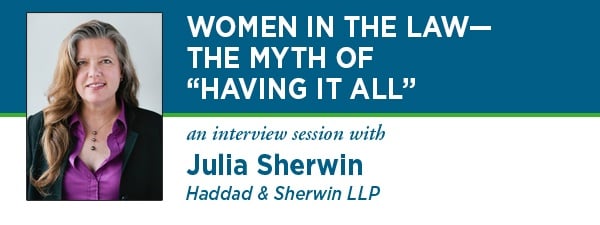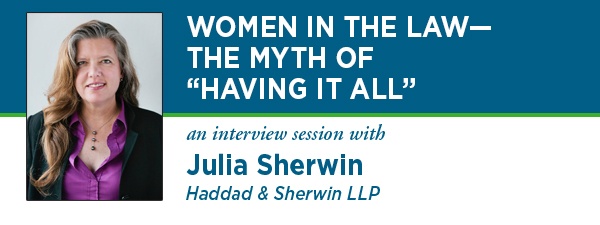The Myth of “Having it All”: an Interview with Julia Sherwin, Esq.
By: Elizabeth DiNardo, Esq. | Associate Counsel

 With the rise of social media and constant communication, it seems that we live in a world of relentless peer competition to prove who has the most fulfilling life. Images flash along an Instagram or Facebook feed showing well-behaved children, beautifully decorated homes and expensive vacations to exotic locales. These images are used to project a version of a life that may not match up with day-to-day realities. The posted pictures do not show an exhausted child’s meltdown in the middle of that expensive vacation, that beautifully decorated home when it is a cluttered mess at 6:30 pm on a weeknight, or a weary woman who has returned home from a long, aggravating day at the office to face a second shift of domestic chores and childcare.
With the rise of social media and constant communication, it seems that we live in a world of relentless peer competition to prove who has the most fulfilling life. Images flash along an Instagram or Facebook feed showing well-behaved children, beautifully decorated homes and expensive vacations to exotic locales. These images are used to project a version of a life that may not match up with day-to-day realities. The posted pictures do not show an exhausted child’s meltdown in the middle of that expensive vacation, that beautifully decorated home when it is a cluttered mess at 6:30 pm on a weeknight, or a weary woman who has returned home from a long, aggravating day at the office to face a second shift of domestic chores and childcare.
Society often wants to impress upon women that they can, and should, be able to “have it all.” For many young women just starting their careers and considering their futures, the images that society and the media portray of women succeeding in both family and professional life can be both idealistic and unachievable.
Thus, while striving (but often failing) to attain that a perfect blend of professional and home life, a refreshing dose of reality is a welcomed change. It can be reassuring to know that other women struggle with comprehending the reality of “having it all.” California attorney Julia Sherwin is one of the women calling attention to this impossibly high standard. “‘Having it all’ always sounded unrealistic and exhausting to me,” Julia said when we recently we sat down with her to get her opinions on what life is like as a woman in the legal industry.
Julia Sherwin has blazed a successful career path standing up for the rights of others. Most attorneys like to think that they are always standing up to the face of injustice on behalf of their clients in one way or another, but there is something uniquely crusading about Julia Sherwin. Ms. Sherwin and law partner and husband, Michael Haddad, have made it their mission to fight for the civil rights of others. What is especially inspiriting about Ms. Sherwin is her refreshing honesty. When asked about the struggle that many women face in the legal industry on striking the right tone in their work, not seeming too soft or conversely too aggressive, Julia responded, “I think it’s really important to be your authentic self and not try to be more aggressive or softer than you are. There will always be people who think you are difficult when you don’t give them what they want, which is just part of the job.”
Like many of the women we have interviewed in previous installments of this series Julia has often been faced with situations in which her gender seemed to be something that her opponents either consciously or subconsciously couldn’t move past. Some of the stories she related exposed the harsh reality of how much gender discrimination female attorneys still face. Julia tells of how when she was a new lawyer starting out in the late 1990s, she was repeatedly referred to as “young lady” by judges, opposing counsel and even witnesses. This sort of backhanded sexism is something that many women in this profession experience on a regular basis and learn to ignore and rise above. However, sometimes the bias is too blatant to overlook and must be addressed. Julia related to us a time when an expert crossed the line by stating: ‘if I knew you [instead of the male attorney in our office] were coming I would have gotten us some porn.’” It is unimaginable that such a vulgar statement would ever be made to a male attorney, yet most women in the legal profession have encountered some variation of this experience. Hearing the real-world struggles of a successful female attorney differs greatly from what we see on television legal dramas or in fast-paced movies featuring beautiful poised women in skin-tight pencil skirts and sky-high heels. These portrayals never represent a realistic image for women in the law who struggle to find fashionable, respectful, yet appropriate attire for the office and the courtroom.
When asked about the way that clothing and physical appearance play into her work, Julia commented, “I think people judge women for what they wear and how they appear much more than they judge men.” This is a resounding opinion that we have discussed in previous installments of this series. It is generally acknowledged that while the standard practice for a man is to wear a suit to court, women have to take into account many different factors. Julia recalls her first warning that sometimes a woman’s attire gains more attention than her work: “I was in law school during the O.J. Simpson criminal trial, and watched the media comment on how Marcia Clark had changed her hairstyle—rather than her cross-examination of the witnesses— this was a lesson for me.”
In her own practice, Julia has made a conscious decision to make the unjust conduct of a defendant, not her appearance, the focus of the jury. “In court I always dress conservatively—no flashy jewelry, heavy makeup or wild shoes. I wear the same black pearl necklace and earrings everyday of trial. I want the jury to focus on the defendants’ bad conduct and not what I’m wearing.”
We concluded our conversation by asking Ms. Sherwin her advice for young female attorneys just entering the profession. Many of the women interviewed in this series have stressed the need for women in the legal profession to become more united in their support for one another through mentoring. Julia responded to our question with advice to both new lawyers and seasoned attorneys alike. “It is important for women in the profession to recognize that we are setting examples all the time for those who come after us, even if we do not formally “mentor” younger women. I also think it is important for women on both sides of the “v” to honor each other and treat each other with respect and dignity regardless of what side they are on. By being a grounded and respectful opposing counsel, I can show the younger women on the other side of my cases that you can provide strong and aggressive representation of your clients without being an unreasonable jerk…I have noticed a general decline in civility in the profession, which saddens me. It would be good for all of us, new lawyers and old, to remember that we can disagree with respect and dignity.” Ms. Sherwin, we can’t agree more.
A special thank you to:
Julia Sherwin, Esq. | Sherwin & Haddad
505 Seventeenth Street
Oakland, California 94612
510-452-5500
Counsel Financial provides working capital credit lines exclusively for the plaintiffs' bar in all states except California, where credit lines are issued by California Attorney Lending.




